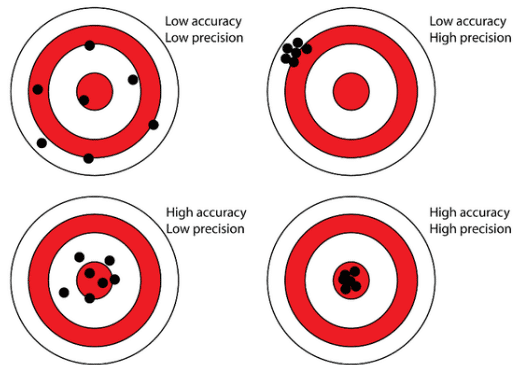Difference between Accuracy and Precision

The difference between accuracy and precision is that Accuracy means how close a measured value is to the actual value and Precision means how close the measured values are to each other.
Although the two words accuracy and precision can be synonymous in Everyday use, Both accuracy and precision reflect how close a measurement is to an actual value, they have certain nuances that set them apart.
We use many devices to measure physical quantities, such as length, time, and temperature. They all have some limit of precision. Each measurement device has some least count. The precision of the device depends on its least count, therefore, all devices have some limit of precision.
Accuracy Vs Precision
| Accuracy | Precision |
| Accuracy means how close the results to the actual value. | Precision means how close the results are with each other. |
| Accuracy is the measure of quantity to reality. | Precision measures how well measurements can be reproduced. |
| Accuracy takes into account the accepted value. | Precision does not take into account the accepted value. |
| Inaccuracy, bad results would be far from the actual value. | In precision, bad results would be scattered. |
| Accuracy does not speak about the quality. | Precision speaks about quality. |
| Accuracy has a single factor. | Precision has multiple factors. |
| It is concerned with a systematic error. | It is concerned with random error. |
Now! we learn in detail about accuracy and precision with examples, so stay with us for a few minutes.
What is accuracy?
Accuracy indicates the degree of closeness or proximity between a measured value, or a series of observed values, with the actual value of something. Thus, accuracy increases the closer measurement of an object is to the actual measurement of that object.
Likewise, accuracy is related to closeness to a specific reference point or target.
Accuracy depends on the calibration of the measuring instruments. The better they are calibrated, the less is the margin of error and the more accurate is the instrument.
Examples of accuracy
If a person practices target shooting and hit the center of the target, this person has shot accurately.
In the classroom, there are 28 people seated and 5 standing. The teacher asks if anyone can guess how many people are in the room with the naked eye. A student takes a look and says that there are 27 people sitting and 5 standing. In this case, the observation of the student has been quite accurate.
What is precision?
The term precision is used as a synonym for accuracy frequently in everyday life. However, precision refers to the degree of proximity or closeness of the results of different measurements to each other, while accuracy is the closeness of the value of a measurement to the real value of what is measured.
An important aspect of precision has to do with repeatability. That is, how often a series of measures or actions are repeated, whenever similar instruments are used, the same is measured and under the same conditions.
For example, if different measurements of an instrument give similar results on the same element, it can be said that said instrument gives precise measurements, regardless of whether they are exact.
This means that the results obtained when making the measurements are denser in a specific area, being able to distinguish a pattern of truth. The more concentrated the results, the greater the degree of precision.
Conversely, if the results of a series of measurements made (under the same conditions) by an instrument are scattered or very different from each other, it can be said that the instrument is imprecise.
Examples of precision
During a soccer match, a striker kicks the ball into the opponent’s goal 7 times, of which 6 of them end up hitting the left post and another passes near the same post, without getting a score for his team. This striker is quite accurate since he always shoots at the same point, but he is also very inaccurate because he cannot score.
Another example of precision if a person is weighed for four days in the morning on a scale and the result is 70 kg, 69.5 kg, 70.2 kg, and 69.75 kg. In this case, the measurement is quite accurate, as the results of each individual measurement are quite similar.
On the other hand, if the person in the previous example weighs 73 kg, it is likely that the scale has a problem and therefore its results are inaccurate, even if they are accurate.